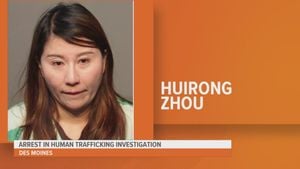President Joe Biden and Chinese President Xi Jinping recently sat down for what may be their final meeting during Biden's presidency. This significant encounter took place on November 16, 2024, in Lima, Peru, on the sidelines of the Asia-Pacific Economic Cooperation (APEC) summit. From the get-go, the atmosphere was cordial, marked by the traditional handshake and attentive remarks from both leaders as they prepared to discuss pressing global issues.
The conversation began with Xi expressing his satisfaction at seeing Biden again, highlighting the tumultuous history of U.S.-China relations over recent years. "It’s time to look at the past but treat each other as partners and friends rather than adversaries," he remarked, emphasizing the mutual benefits of stability between the two superpowers.
Biden echoed this sentiment, underscoring the importance of open dialogue, especially considering the looming transition to the incoming Trump administration. "We haven’t always agreed, but our conversations have been candid and frank. It’s about preventing miscalculations and ensuring our competition doesn’t escalate to conflict," he stated. This acknowledgment hints at the delicate balance both leaders are attempting to maintain amid increasingly complex diplomatic relations.
One of the standout agreements from this meeting focused on artificial intelligence (AI) and nuclear arms control, marking a pivotal moment as they reinforced the necessity for human oversight on nuclear weapon decisions. Biden's national security adviser, Jake Sullivan, highlighted the significance of this agreement, describing it as "an important first step for the two nuclear powers to tackle long-term strategic risks." This conversation reflects growing global concerns about the militarization of AI and the potential consequences of autonomous systems making life-and-death decisions.
During their discussions, both leaders expressed shared goals when it came to AI safety. According to the White House, they affirmed the importance of maintaining human control over the decision to use nuclear weapons, echoing fears over military applications of AI technologies. "The leaders stressed the need to carefully evaluate potential risks as military AI technology develops," the report noted.
While their talks suggested hope for future cooperation, there were significant areas of divergence, particularly concerning North Korea. Biden condemned North Korea's recent military agreements with Russia and expressed his alarm over China’s continued support of Russia’s military capabilities. "The deployment of North Korean troops to support Russia raises serious concerns for global peace and security," Biden said. His assertion reflects broader worries about North Korea’s role and its potential destabilizing impact on the region.
On the topic of Taiwan, Biden urged Xi to de-escalate military tensions. He expressed concerns about the aggressive posture of the Chinese military, calling for restraint, especially as both nations navigate the complex question of Taiwan’s sovereignty. Biden’s remarks come amid growing fears of potential conflict over Taiwan as China maintains its insistence on territorial claims.
Addressing the less contentious issues, drug trafficking and narcotics also came under the spotlight during the meeting. Biden highlighted recent data showing declines in overdose deaths due to collaborative counter-narcotics efforts. This positive trend demonstrates the potential effectiveness of bilateral cooperation on public health issues, fostering optimism about possibilities for future collaboration.
Xi also used the meeting to press the U.S. on its technology export controls, claiming the restrictions are detrimental to both economies. He argued against such “small yard, high fences” policies, urging for more cooperative approaches to technology advancements and economic growth. This was particularly pertinent as Biden's administration has restricted supplies of sensitive technology to China, including advanced semiconductor manufacturing tools deemed potentially harmful to U.S. national security.
Biden's resolve to maintain these export controls was articulated, as he noted these policies would likely continue under the incoming administration. This continuity suggests the strategic concerns about China will persist, regardless of the political shift, as Biden emphasized his administration's alarm over Chinese practices affecting global trade.
With both leaders acknowledging the ups-and-downs experienced throughout Biden's presidency, both politicians are aware of the pressing need to manage their relationship carefully. Indeed, the stakes are high: how China and the U.S. navigate their differences impacts not just their nations, but also international stability.
Moving forward, it is clear the world will be watching closely as the political tide changes with Trump's anticipated return to power. Will he maintain the same diplomatic strategies, or will we see shifts back to more confrontational stances? The outcome remains uncertain, yet the foundations laid during Biden and Xi’s meeting may provide some guidance for future interactions.
The wrap-up from this notable face-to-face meeting reveals both leaders' commitment to balancing competition with partnership, with the hope of fostering lasting stability. The importance of human control over warfare—a concern expressing both caution and foresight—highlights their recognition of the challenges posed by AI technology. While contentious discussions surrounding North Korea and technology policies remain unresolved, the leaders' cooperative spirit may pave the way for potential diplomatic breakthroughs, no matter the obstacles they face.
While the world grapples with various crises—from climate change to geopolitical tensions—the next chapters of U.S.-China relations will be pivotal. Having made some agreements at this last meeting, Biden and Xi are partly preparing their respective nations for what promises to be yet another challenging era of international relations.
Observers of global politics may wonder whether today’s agreements will be seen as mere footnotes or as significant steps toward stability and cooperation. One thing is clear: the attention paid to AI and nuclear weapons control may set the precedent for future discussions between these world leaders.
So, as both leaders wave goodbye to each other at the end of their meeting, they are not merely parting as rivals—they are stepping away as partners who know the health of their relationship can shape the future of global diplomacy.



